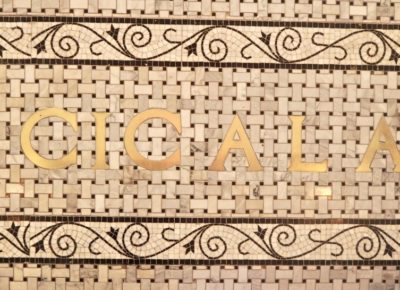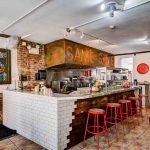Author Archives: vlm
Vernick Food & Drink
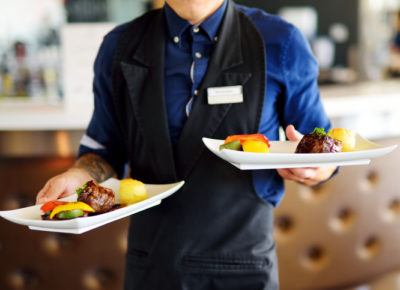
Eckstut first met Greg Vernick when he and his family attended Harris’
“Dollars & Sense of Owning A Restaurant” course. Afterwards, the Vernicks hired him to assist in finding and acquiring the right location and property, and then they continued working together with the planning, permitting, building, and opening.
Through this process, Eckstut helped shepherd the opening of Vernick Food & Drink, one of the most creative/affordable/popular restaurants owned and operated by one of the most talented young chefs in America in the highly desirable west Rittenhouse Square, Philadelphia neighborhood.
Today, Vernick Food & Drink has a “4-Bell” Craig LeBan Inquirer rating and, among other numerous awards, is ranked by USA Today as Philadelphia’s #1 Restaurant.
Cicala At The Divine Lorraine
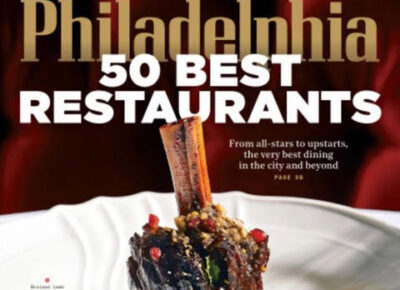
THE RESULTS: OPENING FIRST RESTAURANT FOR CHEF JOE CICALA
- Cicala at the Divine Lorraine opened in November 2019, which was just months before the COVID-19 pandemic.
- Nevertheless, Cicala at the Divine Lorraine was listed in Philly Mag’s Philadelphia’s 50 Best Restaurants.
- Additionally, the restaurant earned a 3 bells from Craig Laban.
OPENING FIRST RESTAURANT FOR CHEF JOE CICALA
- We begin with an understanding of the owner’s vision: menu, price points, branding, restaurant size, demographics, locations and financial capabilities and opportunities.
- From this basis, we put together initial projections of sales, followed by project costs of operating the business.
- We also put together estimated costs to open the restaurant: construction, soft costs (including leasing, licenses, permits, professional fees, financing costs, initial marketing, etc.), time-lines, and operating capital.
- Next, we created an initial business plan for potential lenders, investors, landlords, and other stakeholders.
- At this time of the planning phase, we can get a clearer understanding of the size of the space and rent/debt service that is affordable.
- We then begin to search for the ideal space that fits the demographics and “people traffic” needed to support the projections and vision. After identifying a space, we negotiate a Letter of Intent with the property owner.
- We identified potential investors and created an investor scenario for sales and returns on their investment.
- Next came the appropriate financing for building, opening, and operating the restaurant. These steps were followed by: initial designs, permitting and licensing processes.
- With permits and financing in place, construction began. Next, we implement marketing strategies, management hiring, and staff training.
- UNDERSTANDING THAT FOR THE SUCCESS OF A NEW RESTAURANT, THERE MUST BE THE RIGHT AMOUNT OF OPERATING CAPITAL, we budgeted and put in place for all aspects of building and opening the restaurant. These budgets had the necessary oversight and supervision to ensure that there was money in the bank for operations after opening.
Opening a 2nd location – Pop Shop, Medford NJ

This client has had a successful first location for over a decade and wants to grow the brand and business by opening a second location. Hoping to franchise in the future, the partners were advised to have multiple successful operations.
The client’s personal resources are limited, so they need to have an investor and/or partner. Banks are not yet ready to finance a second location.
Harris and the partners created a beginning 2 step plan:
Step 1. Find a location that is affordable for the sales and operating expenses.
Step 2. Find an investor who believes in the concept and the chosen location and is willing to risk money for a healthy return.
After getting the financing, investor, and location, the next steps included: retaining an architect, kitchen designer, interior designer, expediter, contractor, and all the other professionals needed to get approvals for the property, the actual building of the new restaurant, and then opening the restaurant.
The next phase of work included the many aspects of planning for opening and operating the restaurant, budgeting and implementing opening expenses, hiring and training management, training staff, personnel rules, systems organizations, bookkeeping, menu development, construction oversight and coordination, marketing strategies and implementation, website development, vendor development, purchasing and production, etc., etc..
The doors opened in 2015, and today this is a very busy, profitable second location.
Revitalization of Urban Main Street Storefront BART’S BAGELS

Through a recommendation of a past Main Line Philadelphia restaurant client, Harris was approached by a technology professional wanting to change careers and get into a business he dreamed of owning, a high quality New York bagel making enterprise.
He had studied the art and science of making a high quality bakery and “staged” at a few of the best bagel production businesses in the country. He knew his hometown of Philadelphia did not have the great New York city bagel that he and his family have been so fond of over the years. So, his goal was to fill this gap by making the perfect New York bagel in Philadelphia.
The facility and production capabilities, including a custom-made bagel oven, were the first priority.

Harris, having worked with the Lancaster Avenue Community Development Corporation (PEC-CDC, https://www.pec-cares.org), was able to access a space that had Federal Grants available for build-out and equipment.
Working with the business owner and his business plans, Eckstut negotiated a long-term lease that included the significant grants for the build-out and equipment purchases.
In December, 2019, Bart’s Bagels 3945 Lancaster Ave in Philadelphia https://bartsbagels.com opened to rave reviews with bagel sales that matched the production capabilities of the specifically designed equipment and kitchen facilities.
Green Line Cafe Expansion into Center City

Green Line Cafe is a successful coffee shop client who has been in business for 10+ years, having several locations in the University City area, and wants to expand to Center City Philadelphia.
Process of Eckstut Consulting:
It is determined how much space is needed that works for the demographics, the rent, and other monthly property expenses that the client can afford, including tenant improvement money needed from the landlord.
Search for location:
Direct communication contacts with numerous commercial retail brokers in the region
Contact friends and associates with knowledge of the area
Direct contact with property owners
Visit potential sites.
Decide on site. Negotiate a letter of intent for rent, term of lease, guarantees, tenant improvement money, landlord’s work, contingencies.
In conjunction with attorneys, write and review lease.
Self-financing
Sign lease and begin build-out.
The client successfully opened another café at a corner location in the Comcast Center area that is now thriving.
University City Science Center Restaurant

- Eckstut was hired by Wexford Science & Technology, the new partners at the University City Science Center, to investigate the then tenant who had stopped paying rent, claiming he wasn’t doing enough business and wanting to restructure the deal. Eckstut reviewed all aspects of the business from the sales and marketing and service and quality, to the profit & loss status. He reviewed the business relationship as well as the debt status.
- Harris did an analysis of the multiple problems that existed for the business – how it was structured and how it was operating. He presented a variety of strategies for the current operations or the alternatives of ending the business relationship with the landlord.
- The property owner decided to end its business relationship with the tenant and for Eckstut to work with commercial retail leasing associates to find a new tenant that would bring a quality, successful operation. After a search of numerous independents that Harris presented to the building owners, they selected the up and coming now multi-unit Han Dynasty.
Shorty’s Sunflower Cafe, Pottstown, PA
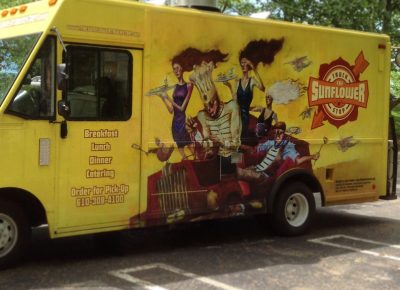
Shorty’s Sunflower Cafe is a long-time very successful breakfast and lunch business featuring farm-to-table breakfast and lunch, located in exurban Philadelphia. For years the sales had been mainly stagnant due to location and limited marketing opportunities for a mostly semi-rural location. The owners (husband & wife) contacted Harris to help grow the business.
To try and grow sales, it was decided to acquire, build-out, and “wrap” a food truck with their name and logo. As a “moving billboard,” presenting its great food and reasonable prices, Shorty’s Sunflower Cafe believed that more people would get to know of the restaurant, and be able to find it.
After Sunflower invested $50,000, the truck was properly outfitted, licensed and went into business by attending nearby events and festivals.
The food truck became so popular that people began going out of their way to eat at the bricks and mortar location. So much so, that in 2 years time, the bricks and mortar business increased sales over 50%.
To accommodate the now “bursting at the seams” location, the restaurant expanded into the adjacent spaces, doubling its size. And the business grew exponentially to the point that it was so busy that the owner did not have the time or energy to take the food truck out to events,
And so the truck was sold for more than the initial $50,000 investment.
Landlord Review of Troubled Property

Han Dynasty
- Harris was hired by the landlord and financial partner of a relatively new restaurant that had not been performing to expectations. Harris reviewed all aspects of the business from the then current operating pro forma with the initial expectations and pro formas.
- His forensic analysis of the sales and costs and management provided the understanding as to why the business was losing significant money and not able to pay the rent
- In his review, Harris presented a variety of strategies for the current operations to turn around operations and sales or the alternatives of ending the business relationship with the management partner. Presenting what the values would be for the financial partner/landlord in each of the ways to move forward.
The property owner decided to end its business relationship and for Harris to assist with finding a new tenant that would bring vitality and life to the building and the surrounding neighborhood as well as a successful operation.
After a search of numerous independents that were presented to the building owners including “tastings” and research on the tenant, the now multi-unit Han Dynasty was selected.
Opening New Small Restaurant – Limited Budget
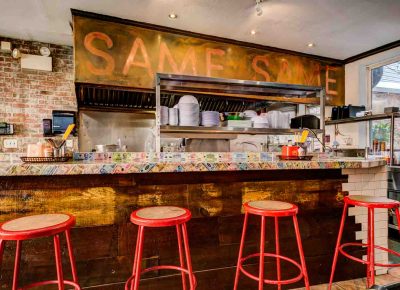
Client
Prospective restaurateur just came back from living, working and traveling overseas for 5 years.
Operator wants to put this experience and knowledge into opening and operating his own new small restaurant – from which he hopes to grow many.
The concept is an Asian street food menu with low to moderate price points using the specialty foods and spices of his adopted home.
He has saved $30,000 to put into the new operation. After review of opening and operating expenses, we determine a budget of $100,000 – if we can find an ideal location that had been a previously existent restaurant. Doing so would avoid many new restaurant business expenses: zoning/legal expenses, infrastructure (plumbing, exhaust, electric, etc.) construction expenses, etc. This type of property is in great demand, so to compete with other potential property users, we put together a sound business plan for potential landlords of a successful concept with the right owner/operator who will be able to pay rent on time, all the time.
Next Step
The operator identifies where and how he can get access for the $70,000 budget gap. This is identified so we move forward.
The property is found – the right location, the right size, the right rent. The operator sells himself to the property owner and a lease agreement is reached.
To stay within budget, a lot of the work that is often done by other professionals that can be done by the individual is identified. Although it will take longer, the owner has the time to do so to save the money to proceed forward in all areas. He gets “over the counter” zoning use approval that the property is being used for purposes allowed; he gets his EIN federal number and City Business license; he draws and presents plans to the health department; he contacts the water, gas and electric companies to open accounts and review of utilities with kitchen and building plans; he gets other appropriate licenses such as: sign permits, sales tax license, etc.; he builds the counter, paints the interior and exterior. His spouse becomes Quickbooks trained and learns bookkeeping with the advice of their accountant.
After two months and lots more planning and organizing: website, menu, other marketing, kitchen equipment, service equipment, furniture and fixtures, purchasing, production, etc., THE DOORS ARE OPENED – and they are VERY VERY BUSY!!!

